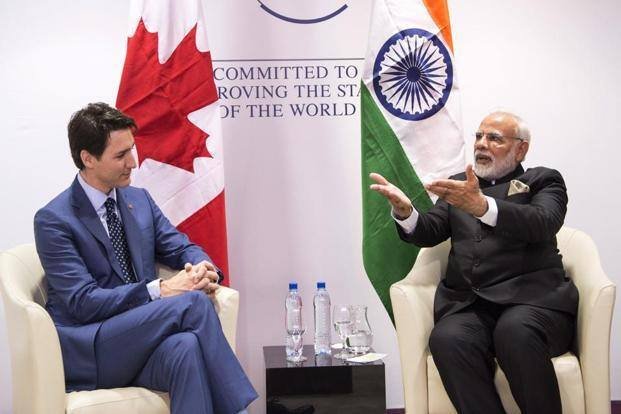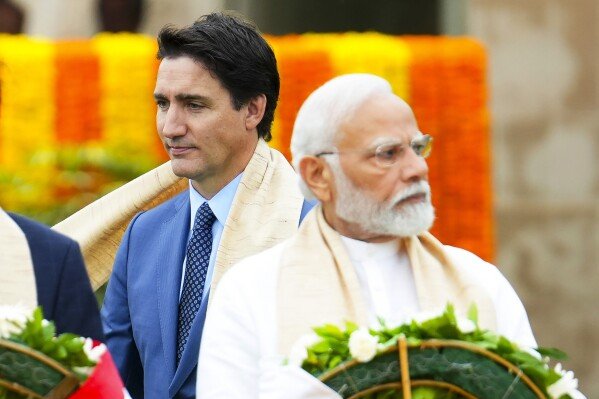G7 Summit: PM Modi to Meet Trudeau Amid Diplomatic Row
The G7 Summit, a pivotal forum for addressing global economic challenges and fostering international cooperation, will witness a significant diplomatic interaction this year as Indian Prime Minister Narendra Modi and Canadian Prime Minister Justin Trudeau come face to face.
This meeting comes amid a heightened diplomatic row between India and Canada, adding a layer of tension to the summit’s proceedings. This article delves into the background of the diplomatic rift, the stakes involved, and the potential implications of this high-stakes encounter.
Background of the Diplomatic Row
The diplomatic tension between India and Canada has been escalating over the past few years, primarily due to two major issues:
- Khalistani Separatist Movement: Canada is home to a significant Sikh diaspora, some of whom support the Khalistani separatist movement, which seeks an independent state for Sikhs in Punjab, India.
The Indian government has long been concerned about the activities of Khalistani sympathizers in Canada, accusing the Canadian government of not taking adequate action against them.
- Human Rights Concerns: Canada has raised concerns over human rights issues in India, particularly in relation to the treatment of minorities and the government’s handling of protests.
These concerns were most notably highlighted during the farmers’ protests in India, where many Canadian politicians, including PM Trudeau, expressed support for the protesters.
These issues have strained bilateral relations, leading to a series of diplomatic exchanges and a cooling of ties.
The G7 Summit Context

The G7 Summit, scheduled to take place in [Summit Location] from [Dates], will bring together leaders from seven of the world’s largest advanced economies—Canada, France, Germany, Italy, Japan, the United Kingdom, and the United States—along with the European Union.
India, while not a member, has been invited as a special guest, reflecting its growing importance on the global stage.
The summit provides a platform for discussing a wide range of issues, including global economic stability, climate change, and international security.
However, the Modi-Trudeau meeting will be closely watched for its potential to either ease tensions or exacerbate the diplomatic rift.
Key Issues at Stake
- Bilateral Trade and Economic Cooperation: India and Canada share significant economic ties, with bilateral trade reaching approximately $10 billion annually. Any prolonged diplomatic fallout could impact trade relations, investment flows, and economic cooperation.
- Geopolitical Alliances: Both countries play crucial roles in their respective regions. India is a key player in South Asia and the Indo-Pacific, while Canada is influential in North America and within the Commonwealth. The outcome of their interaction at the G7 could influence broader geopolitical alignments and collaborations.
- Diaspora Relations: The large Indian diaspora in Canada, particularly the Sikh community, is a significant factor in bilateral relations. Managing diaspora concerns while maintaining diplomatic protocols is a delicate balancing act for both leaders.
Potential Outcomes of the Modi-Trudeau Meeting

- De-escalation of Tensions: A direct conversation between Modi and Trudeau could pave the way for a de-escalation of tensions. Both leaders could agree on mechanisms to address mutual concerns, such as enhancing cooperation on security issues and fostering dialogue on human rights.
- Status Quo: The meeting might result in maintaining the current status quo, with both sides agreeing to disagree on certain issues while continuing to engage on other fronts, such as trade and climate change.
- Further Escalation: If the discussions turn contentious, there is a risk of further escalation in diplomatic tensions. This could lead to more stringent measures from both sides, such as trade restrictions or diplomatic downgrades.
Broader Implications
The Modi-Trudeau interaction at the G7 Summit holds broader implications beyond bilateral relations:
- International Diplomacy: The handling of this diplomatic row will be scrutinized by other nations, potentially influencing their own diplomatic strategies and alignments.
- Global Governance: The G7 Summit, aimed at fostering global cooperation, could be impacted by bilateral tensions among its participants. The ability of the G7 to address global challenges could be undermined if member countries are embroiled in diplomatic disputes.
- Domestic Politics: Both Modi and Trudeau face domestic political considerations. How they navigate this diplomatic encounter could impact their standing at home, influencing public opinion and electoral prospects.
Conclusion
As the G7 Summit approaches, the anticipated meeting between Prime Minister Narendra Modi and Prime Minister Justin Trudeau stands out as a critical moment in international diplomacy.
The outcome of their interaction could significantly shape India-Canada relations and set the tone for how global leaders manage bilateral tensions within multilateral forums.
Observers worldwide will be keenly watching for any signs of reconciliation or further discord, understanding that the stakes extend far beyond the immediate concerns of the two nations involved.




